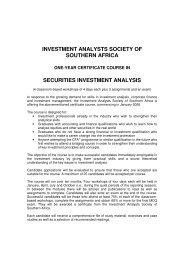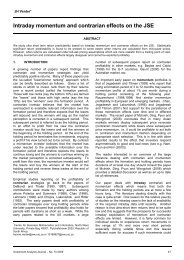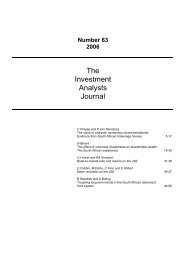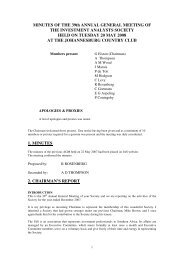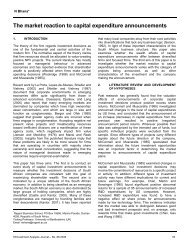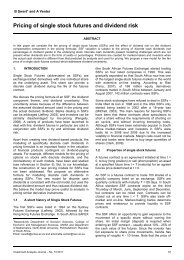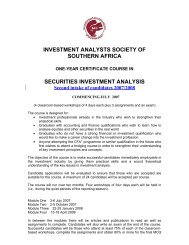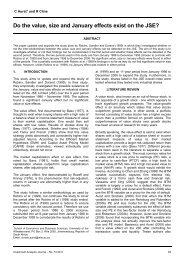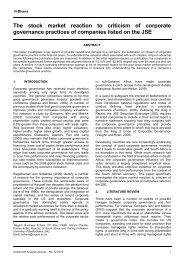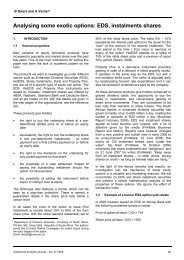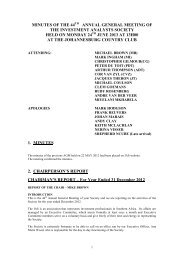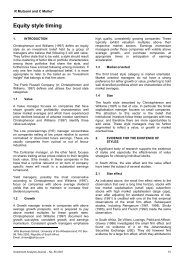Accounting is Broken - Investment Analysts Journal
Accounting is Broken - Investment Analysts Journal
Accounting is Broken - Investment Analysts Journal
Create successful ePaper yourself
Turn your PDF publications into a flip-book with our unique Google optimized e-Paper software.
Stern Stewart & Co.<br />
Equity Capital <strong>is</strong> Costly<br />
Economic profit eliminates<br />
th<strong>is</strong> glaring d<strong>is</strong>tortion.<br />
It more accurately<br />
m e a s u res corporate perf<br />
o rmance by subtracting<br />
the cost of all re s o u rc e s<br />
used to generate re v-<br />
enues, including the cost<br />
of equity capital.<br />
It doesn’t work out for<br />
each stock, of course,<br />
nor in every year, but<br />
over time a portfolio of<br />
common stocks does<br />
tend to pro v i d e<br />
investors with a 2 to 7<br />
p e rcent re t u rn pre m i u m<br />
that compensates them<br />
for r<strong>is</strong>k.<br />
Although abstract in<br />
n a t u re, the cost of equity<br />
<strong>is</strong> as real as any cost<br />
can be in terms of its<br />
implications for a firm<br />
and its shareholders. If<br />
a firm cannot earn a<br />
re t u rn on equity above<br />
its cost, its share h o l d e r s<br />
will abandon their supp<br />
o rt for the stock and<br />
will set its price at a d<strong>is</strong>count<br />
to book value.<br />
Many of the past<br />
decades’ high flyers like<br />
WorldCom and Enro n<br />
would surely have been<br />
m o re deliberate in their<br />
g rowth had they been<br />
f o rced to recognize the<br />
cost of all the equity<br />
capital they were pouring<br />
into their businesses.<br />
As has been noted, the most egregious error accountants are now making <strong>is</strong> considering<br />
equity capital a free re s o u rce. Although they subtract the interest expense associated with<br />
debt financing, they do not place any value on the funds that shareholders have put or left<br />
in a business. Th<strong>is</strong> aston<strong>is</strong>hing oversight means that companies often re p o rt accounting<br />
p rofits when they are in fact destroying shareholder value.<br />
Economic profit eliminates th<strong>is</strong> glaring d<strong>is</strong>tortion. It more accurately measures corporate<br />
p e rf o rmance by subtracting the cost of all re s o u rces used to generate revenues, including<br />
the cost of equity capital. At its most basic:<br />
Economic Profit = <strong>Accounting</strong> Profit - The Cost of Equity<br />
Unlike interest or wages, the cost of equity <strong>is</strong> not a cash cost. It <strong>is</strong> an opportunity cost. It<br />
<strong>is</strong> the re t u rn that a firm ’s shareholders could expect to earn by purchasing a portfolio of<br />
stocks in other companies of comparable r<strong>is</strong>k. If a firm cannot give its shareholders at least<br />
the re t u rn that they could earn by investing on their own, it will lose value. It does not<br />
begin to earn a profit until it can cover the opportunity cost of its equity capital. Th<strong>is</strong><br />
insight <strong>is</strong> the fundamental diff e rence between accounting profit and economic pro f i t .<br />
The re t u rn that investors expect from investing in equity portfolios has been the subject of<br />
intense theoretical and empirical re s e a rch by academic scholars. The finding that has stood<br />
the test of time <strong>is</strong> that investors want to be compensated for bearing r<strong>is</strong>k, and over time,<br />
they are. Shareholders so d<strong>is</strong>count a firm ’s future prospects when they establ<strong>is</strong>h the price<br />
they will pay for its shares that they are likely to earn a re t u rn well above the yield available<br />
to them from relatively r<strong>is</strong>k free government bonds. It doesn’t work out for each stock, of<br />
course, nor in every year, but over time a portfolio of common stocks does tend to pro v i d e<br />
investors with a 2 to 7 percent re t u rn premium that compensates them for r<strong>is</strong>k. With gove<br />
rnment bonds currently yielding about 5 percent, shareholders are now demanding long<br />
run re t u rns from their equity investments of from 7 to 12 percent per annum. Companies<br />
must earn that re t u rn as a cost of doing business.<br />
Although abstract in nature, the cost of equity <strong>is</strong> as real as any cost can be in terms of its<br />
implications for a firm and its shareholders. If a firm cannot earn a re t u rn on equity above<br />
its cost, its shareholders will abandon their support for the stock and will set its price at a<br />
d<strong>is</strong>count to book value. But if a re t u rn above the cost of equity can be achieved, a firm will<br />
sell for a premium over its book value, and it will have created wealth for its share h o l d e r s .<br />
The cost of equity <strong>is</strong> the cutoff rate to create value with capital, an inv<strong>is</strong>ible but pro f o u n d<br />
dividing line between superior and inferior corporate perf o rm a n c e .<br />
The diff e rence between accounting profit and economic profit <strong>is</strong> often considerable. A<br />
company with re p o rted net income of $80 million <strong>is</strong> on its face healthy. But if it ties up $1<br />
billion in shareholder capital on its balance sheet, and if its cost of equity <strong>is</strong> 10%, the firm<br />
<strong>is</strong> actually producing a $20 million loss compared to the alternative investment uses of that<br />
capital. The likely consequence <strong>is</strong> that it will trade for a market value significantly less than<br />
its $1 billion book capital, the diff e rence reflecting the shareholder wealth that has been lost<br />
t h rough m<strong>is</strong>allocation or m<strong>is</strong>management of capital.<br />
Economic Profit = <strong>Accounting</strong> Profit - The Cost of Equity<br />
Economic Profit = <strong>Accounting</strong> Profit - (COE% x $Equity Capital)<br />
$ - 20 Million = $ 80 Million - ( 10% x $1 Billion )<br />
Many of the past decades’ high flyers like WorldCom and Enron would surely have been<br />
m o re deliberate in their growth had they been forced to recognize the cost of all the equity<br />
capital they were pouring into their businesses.<br />
4



